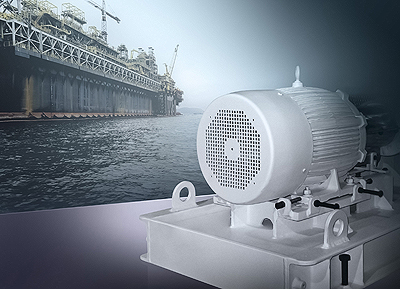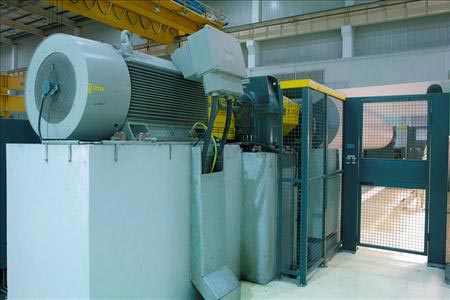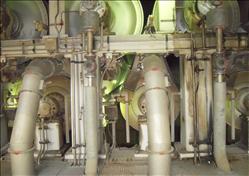Displaying items by tag: siemens
Greentelligence with Siemens at the Hannover Messe 2012
Siemens' exhibit at the Hannover Messe 2012 will be focused on increased networking in industrial production. "Modern industrial companies want to interlink relevant information along their entire value creation so that they can become more productive and more efficient. As the leading supplier of industrial software and production technology, we are the key company able to meet this requirement and to create truly sustainable production processes," said Ralf-Michael Franke, CEO of Siemens' Drive Technologies Division, at the company's press conference in advance of this year's Hannover Messe. In keeping with its motto of "Connecting Productivity and Efficiency," Siemens will demonstrate how its customers can achieve both economic and environmental goals. Siemens' primary levers for simultaneously increasing productivity and efficiency of its customers are innovative industrial software, in-depth verticals expertise, and a comprehensive service portfolio for the entire lifecycle.
In to the area of automation and drive technology, Siemens relies on products, systems, and services that – thanks to software-based integration – can interact with each other along the entire value chain. With this type of closed-loop integration, Siemens customers are able introduce new products more quickly and organize their production processes in a cost-effective, energy-efficient manner. According to Franke, complete drive systems, from control units to motors and gear technology, can be integrated into customers' plants to increase efficiency values by up to 70 percent, especially in energy-intensive segments like the chemical, metal and paper processing industries. At the Hannover Messe, Siemens will be introducing the new Simogear geared motor series. Like the entire drive portfolio, Simogear can be efficiently incorporated in customer systems using the Totally Integrated Automation Portal (TIA Portal). The new series reaches efficiency levels of up to 96 percent.
"Companies that wait until production is running to tackle production-related challenges cannot sufficiently tap their potentials for savings and improvements," explained Thomas Schott, head of Factory Automation at Siemens. "Utilizing our complete portfolio, and beginning as early as the product design and production planning stages, we exploit significant potentials for improving productivity and energy efficiency." To do this, Siemens relies on integrated technologies that span the entire value creation process, from product design to production and maintenance, including all related services. Using the TIA Portal, which will be exhibited in Hannover, companies can configure all of their engineering tasks related to automation and drive technology from a single software tool. That can decrease engineering-related cost by up to 25 percent. According to Schott, Siemens' industry expertise, especially in the area of energy savings, has also been incorporated into the latest products. For example, at the Hannover Messe Siemens will be introducing version V5.3 of the Simatic B.Data energy management system, which can transparently depict and help decrease energy consumption in the various shift operations of a given production operation.
According to Dirk Hoke, CEO of the Customer Services Division which bundles all of the Industry Sector's service activities, technology- and IT-based services as well as vertical expertise are also becoming more important in the service business. "Our goal is to be a reliable partner throughout the entire lifecycle of our customers' systems. Since we are familiar with their systems and processes, we can support them in a targeted manner in their value creation process. This also puts us in a position to recommend tangible optimization measures that will, for example, improve energy efficiency and resource utilization. As a result, we are uniquely capable of supporting our customers with specific strategies that will ensure both economic success and environmental responsibility."
Siemens delivers efficient pump skid for produced water treatment on FPSO
Bluewater Energy Services in Hoofddorp, the Netherlands, has placed an order with Siemens Industry Automation Division for supplying a pump skid that features Brise dissolved gas flotation (DGF) technology. The skid is part of the produced water system on the Glas Dowr, which is a floating production storage and offloading unit (FPSO). The FPSO has been relocated to the Kitan field in the Joint Petroleum Development Area, offshore East Timor, Australia.

The Brise DGF pump technology from Siemens has been installed on an existing degassing tank for the upgrade to the produced water treatment plant of the Glas Dowr. The Brise DGF technology helps optimize gas bubble size for the flotation process, which in turn yields improved capacity and efficiencies. It also saves required chemicals and offers end-users maximum flexibility because the bubble sizes can be instantly adjusted to meet requirements.
The DGF technology can be used with new flotation units, existing systems, and as part of an upgrade or retrofit. Siemens has completed more than 200 retrofits/upgrades successfully on a wide range of Siemens equipment as well as that of third parties - equipment such as skimmers, degassers and mechanical flotation tanks. Using the DGF technology results in substantial savings for end-users, due to improved efficiency of existing equipment. Depending on how complex the equipment is, necessary adjustments can be made and recommissioning done within a few days. This makes the Siemens technology a more cost- and time-effective alternative to completely replacing the system with new equipment.
Brise is a trademark of Siemens and/or its affiliates in some countries.
Further information about solutions for water treatment is available at: http://www.siemens.com/water
Siemens to supply first pre-engineered integrally geared air compressors to China
Siemens Energy will supply together with its Chinese joint venture SITHCO (Siemens Industrial Turbomachinery Huludao Co. Ltd.) the first two large size, pre-engineered integrally geared compressors for an air separation plant to China. Purchaser is Hangzhou Hangyang Co. Ltd, a company specialized on technology, energy, petrochemical and industrial markets worldwide with a unique portfolio of products, services and solutions, providing large, medium and small size Air Separation Units as well as petrochemical equipment. The new air separation unit will supply gas for a nonferrous metal smelting plant in the city of Fangchenggang in the Guangxi Zhuang Autonomous region in Southern China. The plant will go online begin of 2013.
The Siemens scope of supply encompasses two STC-GC compressors, each with three stages, including gear type coupling, lube oil unit, inlet expansion joint and other auxiliary systems. SITHCO as local Chinese supplier will be responsible for gas coolers, gas/oil/water piping and for the supervision of erection and commissioning on site. The inlet volume flow of the pre-engineered compressors is about 200,000 m3 air per hour. In the air separation process the compressor efficiency is of utmost importance.
The extension of the STC-GC compressor series covers the 120,000-400,000 m3/h capacities at a pressure ratio of 6.5 with 3 impeller stages and adjustable inlet guide vanes for compressor control. Pre-engineering of compressor components allows reducing lead time and costs. The use of well proven components ensures highest plant reliability and availability.
"We are very proud about the first order for our new standardized integrally geared compressor," said Ralf Kannefass, head of the Turbo Equipment business segment in the Siemens Energy Oil & Gas Division. "Based on our proven integrally geared turbo compressors, these units are specifically designed as main air compressors for air separation plants featuring low capital expenditure combined with outstanding efficiency performance."
Siemens equips Chinese paper board greenfield mill

Shandong Bohui Paper Industry Co., Ltd., China, selected Siemens to provide drive technology for its new board paper mill at Dafeng, Yancheng city, in Jiangsu province, East China. The new mill is scheduled to produce 750,000 tons board paper per year based on wood pulp. With the new manufacturing base, Bohui Paper will become China’s biggest board paper mill. The project has a total volume of around 3.8 million euros and is scheduled for completion by end of 2012.
Shandong Bohui Paper Industry Co., Ltd is engaged in the research, development, manufacture, and sale of paper products and paper pulp in China. To increase the production capacity of high-end packaging boards the company is to build a new mill in Yancheng. Siemens will provide the motors for the new board paper machine and for two winder machines.
They are supplied with power via power inverters and rectifiers of the type Sinamics S120. A Sipaper Drives Controller based on Simatic PCS7 is responsible for open-loop and closed-loop control of the machines. The board paper mill will thus have a uniform operator control and visualization platform for all the drive and automation equipment. All together Siemens will install 205 motors, 207 drive loops, and automation and control systems. The company will also be responsible for the engineering and commissioning of the supplied equipment. The drive system application to be used is part of the Sipaper solution specially developed for the pulp and paper industry.
Energy saving in the drying section: Siemens software reduces steam consumption in papermaking
The Siemens Industry Solutions Division has developed a new software solution with an energy-saving control strategy for dryer sections. The Sipaper APC (Advanced Process Control) DrySec is designed to reduce steam consumption in papermaking by decreasing energy needs in the drying process. Optimized set points are calculated for all parameters relevant to drying and adjusted to the actual process conditions. The system has already been piloted successfully at Rhein Papier GmbH’s paper mill in Hürth near Cologne, Germany, reducing the main steam requirement by more than three percent. Optimized process control is important for the entire papermaking process. The goal is to achieve the required product quality while at the same time minimizing the costs of raw materials, additives and energy. Utilizing steam to dry the paper, accounts for a large portion of the energy costs in the paper industry. Siemens has developed the Sipaper APC DrySec software solution to reduce the steam consumption. It is based on a physical process model that takes into account all the parameters relevant to drying. The main focus is on the air requirements, heat recovery, steam and condensate system, together with their mutual interactions and dependencies. Measured values are used to adapt the model at regular intervals to the current process conditions. Sipaper APC DrySec uses this data to calculate the best possible set points and these values are then transferred to the process control system. The air flow in the hood can then be set to minimize the quantity of air supplied.
Optimized process control is important for the entire papermaking process. The goal is to achieve the required product quality while at the same time minimizing the costs of raw materials, additives and energy. Utilizing steam to dry the paper, accounts for a large portion of the energy costs in the paper industry. Siemens has developed the Sipaper APC DrySec software solution to reduce the steam consumption. It is based on a physical process model that takes into account all the parameters relevant to drying. The main focus is on the air requirements, heat recovery, steam and condensate system, together with their mutual interactions and dependencies. Measured values are used to adapt the model at regular intervals to the current process conditions. Sipaper APC DrySec uses this data to calculate the best possible set points and these values are then transferred to the process control system. The air flow in the hood can then be set to minimize the quantity of air supplied.
The system also ensures that water evaporating from the paper web is exhausted continuously without condensation. Depending on the type of paper machine, other parameters can be calculated, such as the heat curve, the heating of the white water and the quantity of steam in the steam box. Sipaper APC DrySec can, in addition, be used as a soft sensor because it also calculates process variables for which no instrumentation is installed. This includes, for example, the moisture content and temperature of the paper web upstream and downstream of each drying cylinder, and the energy consumed in the heat exchanger. This leads to a better understanding of the plant. The process model can also be used for diagnostic purposes. For example, it can detect and display the gradual contamination of a heat exchanger, due to scaling and fouling. Sipaper APC DrySec is one of the modules of the Sipaper solution platform specially developed for the pulp and paper industry. It can be linked to both Siemens and third-party process control systems.
The Siemens solution for an energy-saving operation mode for dryer sections has already been implemented in the papermaking process at Rhein Papier paper mill. Siemens supplied the electrical equipment in July 2001, when the mill was built. Rhein Papier GmbH produces newsprint and is an alliance partner of the Myllykoski Group. Further information about solutions for the pulp and paper industry is available at www.siemens.com
The Siemens Industry Solutions Division (Erlangen, Germany) is one of the world's leading solution and service providers for industrial and infrastructure facilities comprising the business activities of Siemens VAI Metals Technologies, Water Technologies and Industrial Technologies. Activities include engineering and installation, operation and service for the entire life cycle. A wide-ranging portfolio of environmental solutions helps industrial companies to use energy, water and equipment efficiently, reduce emissions and comply with environmental guidelines. With around 31,000 employees worldwide (September 30), Siemens Industry Solutions posted sales of €6.8 billion in fiscal year 2009. Further information and downloads at: www.siemens.com
Boosting production capacity: Siemens to equip a new paper manufacturing line for Moorim Paper Group
The South Korean Moorim Paper Group has commissioned the Siemens Industry Solutions Division to supply complete drive technology for the new product line PM1. The paper machine for coated and uncoated wood-free paper will be installed in the DongHae pulp mill in Ulsan, South Korea. The mill is scheduled to produce some 450,000 tons of coated fine papers per year starting in the spring of 2011. With the new line, Moorim Paper will become South Korea’s largest manufacturer of fine paper.
 In recent years the DongHae paper mill in South Korea has produced pulp from ground wood, as well as paper and paperboard. The production capacity will be further expanded with the new paper machine PM1. Siemens is supplying the complete drive technology for PM1 including the multi-motor drives for the paper machine, offline coater, calendar stack, winder and the rewinder, powered by Sinamics S120CM converters. The scope of supply also includes the automation system with the Sipaper Drive solutions based on Sinamics PCS7. Siemens will also be responsible for the engineering, commissioning and on-site training of the operating personnel.
In recent years the DongHae paper mill in South Korea has produced pulp from ground wood, as well as paper and paperboard. The production capacity will be further expanded with the new paper machine PM1. Siemens is supplying the complete drive technology for PM1 including the multi-motor drives for the paper machine, offline coater, calendar stack, winder and the rewinder, powered by Sinamics S120CM converters. The scope of supply also includes the automation system with the Sipaper Drive solutions based on Sinamics PCS7. Siemens will also be responsible for the engineering, commissioning and on-site training of the operating personnel.
The systems and components to be used are an integral part of the Sipaper solution platform especially developed for the pulp and paper industry. The paper machine itself is being supplied by Voith Paper and will have a wire width of 9,300 millimeters and a design speed of 1,500 meters per minute. It is designed to produce fine paper with basis weights ranging from 75 to 150 grams per square meter. Together with the existing production lines in Jinju (PM1 to PM3) and Daegu (PM1 and PM2), the Moorim Paper Group will increase its total production to over one million tons per year once PM1 has been put into operation. Further information about solutions for the pulp and paper industry is available at http://www.siemens.com/paper
The Siemens Industry Sector (Erlangen, Germany) is the worldwide leading supplier of environmentally friendly production, transportation, building and lighting technologies. With integrated automation technologies and comprehensive industry-specific solutions, Siemens increases the productivity, efficiency and flexibility of its customers in the fields of industry and infrastructure. The Sector consists of six divisions: Building Technologies, Drive Technologies, Industry Automation, Industry Solutions, Mobility und Osram. With around 207,000 employees worldwide (September 30), Siemens Industry achieved in fiscal year 2009 total sales of approximately €35 billion. http://www.siemens.com/industry
The Siemens Industry Solutions Division (Erlangen, Germany) is one of the world's leading solution and service providers for industrial and infrastructure facilities comprising the business activities of Siemens VAI Metals Technologies, Water Technologies and Industrial Technologies. Activities include engineering and installation, operation and service for the entire life cycle. A wide-ranging portfolio of environmental solutions helps industrial companies to use energy, water and equipment efficiently, reduce emissions and comply with environmental guidelines. With around 31,000 employees worldwide (September 30), Siemens Industry Solutions posted sales of €6.8 billion in fiscal year 2009. Further information and downloads at: http://www.siemens.com/industry-solutions
